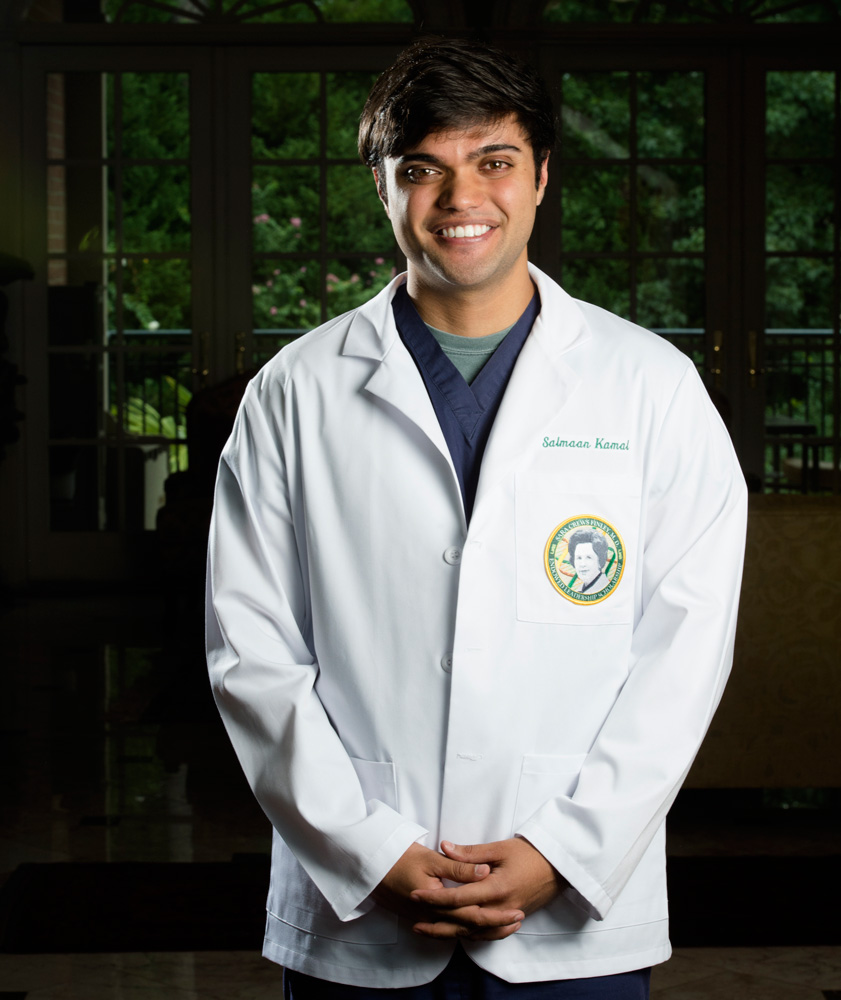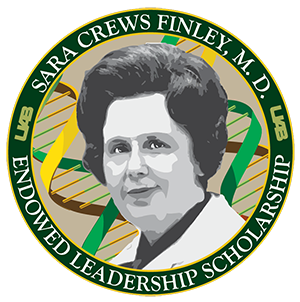 As the second Finley Leadership Scholar, Kamal receives a new white coat with special insignia – and a full-tuition scholarship for his third and fourth years in medical school.Salmaan Zaki Kamal has been selected as the 2016 recipient of the Sara Crews Finley, M.D., Endowed Leadership Scholarship. The scholarship, which supports students who demonstrate exceptional academic and leadership abilities, includes full tuition for the third year of medical school and is renewable for the fourth year.
As the second Finley Leadership Scholar, Kamal receives a new white coat with special insignia – and a full-tuition scholarship for his third and fourth years in medical school.Salmaan Zaki Kamal has been selected as the 2016 recipient of the Sara Crews Finley, M.D., Endowed Leadership Scholarship. The scholarship, which supports students who demonstrate exceptional academic and leadership abilities, includes full tuition for the third year of medical school and is renewable for the fourth year. At the School of Medicine’s White Coat Ceremony for incoming students on Sunday, August 14, Kamal will receive a new white coat with special insignia identifying him as the Sara Crews Finley, M.D., Leadership Scholar.
“I’m thankful and honored to be chosen to represent Dr. Sara Finley’s legacy,” Kamal said. “And it is humbling to be recognized as someone with the integrity to carry out that legacy of service.”
Born in Chicago and raised in Tuscaloosa, where his parents practice medicine – his father is an endocrinologist and his mother a cardiologist – Kamal graduated from Princeton University with a degree in molecular biology. His senior project took him to Sierra Leone, where he researched the accuracy of malaria diagnostic tests at a free clinic run by Wellbody Alliance, an organization that aims to provide healthcare as a human right to the poor in Sierra Leone. That experience including helping Wellbody establish a goat farming initiative (by transporting live goats to farmers via motorcycle) to help improve nutrition and create economic opportunity – not exactly health care, but as Kamal came to understand, directly related to health.
“What struck me about Wellbody was the degree of community engagement in each of its initiatives,” he recalled. “From observing the founder and head physician, Dr. Bailor Barrie, as he interacted with members of the communities he sought to serve, I witnessed how the role of a physician is perfectly designed to effect change. Through treating individuals, a physician can listen to their concerns and learn their aspirations. And after understanding those issues, you can design programs to address them.”
Kamal then spent a year as a fellow at the National Coalition on Health Care in Washington, D.C., before beginning medical school at UAB. “NCHC’s mission is to advocate for innovative methods to improve health care quality and affordability in the U.S.,” he said. “Once again, it seemed that individuals who had served vulnerable populations on the ground were their most successful advocates at the national policy level. My supervisor, Dr. Jack Lewin, who had practiced medicine at Native American reservations, knew how to seamlessly integrate the economic and political ramifications of a proposed policy with its effect on the patients that policy was designed to impact.”
With those experiences behind him, Kamal enrolled in medical school at UAB and immediately became involved with Equal Access Birmingham, the medical-student-run free clinic for underserved patient operated under the supervision of Dr. Craig Hoesley. “One of the first things I did was survey our patients about their primary care experiences with the help of Dr. Stefan Kertesz, hoping to understand how to best serve them moving forward,” he said. “I also polled our exceptionally dedicated student officer corps to understand their goals for the organization.
“By listening to patients and to our leadership, we effectively improved our current operations and also implemented a weekly acute care clinic, reinvigorated our health education efforts with M-Power Ministries, and created a novel partnership with the School to allow students to earn class credit while volunteering at EAB. My time there was the perfect combination of clinical care, program implementation and advocacy.”
Kamal is spending his third year of medical school in Tuscaloosa and nearby areas, starting with a family medicine rotation in rural Fayette, population 4,600. “Again, this was a great opportunity to see how health policy affects the practice of medicine, especially in a rural area,” he said. “Since then, I’ve been on my OB-GYN rotation in Tuscaloosa and have enjoyed being in the hospital, even with the long nights.
“Just this morning, we had a patient whose diabetes was out of control. She was pregnant, and her baby was recently diagnosed with a congenital heart defect. Because medical students have more time to spend with patients than the attending physicians and residents do, I was able to find out what was going on with her – some of her medications were causing her serious side effects which she hadn’t mentioned to her other providers, which explains why she might not be compliant with her own meds. As I learned through EAB and my other experiences, if you take the time to try to understand why a patient is struggling to follow through with their care plan, you can often help them navigate those challenges.”
He is already working on his scholarly research project – required of all UAB medical students prior to graduation – with a focus that grew from his work with homeless patients at EAB. “I’m working with Dr. Stefan Kertesz from the UAB Division of Preventive Medicine and Dr. Karen Cropsey from the UAB Department of Psychiatry to develop a better way to distribute naloxone kits to uninsured and homeless patients at risk of opioid and heroin overdoses,” he said. “We are looking at how to connect with those who need this intervention – identifying the intersections and even soup kitchens where they may gather – and then how to get them to overcome their fear of prosecution so they’ll actually complete the paperwork needed for the kits.”
 Kamal has made no decisions on a specialty, noting that he is following the advice of his physician mentors, parents, grandmother, and sister to let his clinical rotations guide that choice. He is currently serving as the president of the Class of 2018.
Kamal has made no decisions on a specialty, noting that he is following the advice of his physician mentors, parents, grandmother, and sister to let his clinical rotations guide that choice. He is currently serving as the president of the Class of 2018.The Sara Crews Finley, M.D., Leadership Scholarship honors the legacy of a pioneer in medical genetics and a beloved faculty member and student mentor. The goal of the scholarship is to recognize and support students who demonstrate exceptional academic and leadership abilities.
Dr. Finley is remembered as a pioneer in medical genetics at UAB. Along with her husband, Wayne H. Finley, M.D., Ph.D., she co-founded the first medical genetics program in the southeastern United States, and was co-director of the Laboratory of Medical Genetics at UAB for more than 30 years. In recognition of their collective contributions, an endowed chair in medical genetics and the conference center at UAB’s Hugh Kaul Genetics Building bear their names.
According to Sara J. Finley of Nashville, an endowed scholarship to recognize leadership among medical students is the ideal way to honor her mother’s values and passions. “My mother relished her time teaching, advising, and mentoring UAB medical students,” she says. “With the selection of Ryan Khododadi last year as the inaugural recipient, and now with Sal as our second recipient, we know without a doubt that we chose the best path to honor her. She would be very proud to have such a prestigious award established in her name.”